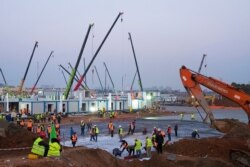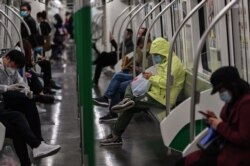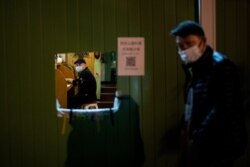The lifting of the lockdown in Wuhan, China, the original epicenter of the coronavirus pandemic, has allowed most healthy residents to travel outside of the city limits since April 8.
But many Wuhan residents are finding that when they travel, or look for jobs in other places, they aren't always welcome. The city has acquired a stigma from being associated with COVID-19, the disease caused by the coronavirus.
"There are all kind of unwritten rules which discriminate against and reject people from Wuhan as well as those from the province of Hubei," a Wuhan resident told VOA on social media. The resident asked to be identified only as "Mr. Yang" for safety reasons. Wuhan is the capital of Hubei province.
Even in the city of Yiwu — 700 kilometers east of Wuhan — factory operators who are hiring workers for their newly-established face mask assembly lines are biased against migrant workers from Hubei, according to a wholesaler there.
"If you don't know them in person, many will hold back on hiring strangers from Wuhan. No priority will be given to them. There's no shortage of labor. Why should we hire those from there?" Eric Lin, a trader who also owns a factory in Yiwu, told VOA.
A former construction worker from the Huoshenshan Hospital, one of Wuhan's makeshift facilities for less severe patients, took to Weibo, China's Twitter-like microblogging platform, to complain about his difficulty in landing a new job after working in Wuhan.
"We can't find jobs elsewhere. Amid a slowing economy this year, no one dares to hire people associated with the Leishenshan or Huoshenshan Hospital," he wrote. VOA's request to talk to him, however, went unanswered.
More than 2,500 people in Wuhan died due to complications from COVID-19. To curb the spread of the infection, authorities imposed a lockdown that turned the city into a ghost town for 11 weeks.
Now, authorities there say the outbreak has been contained and are attempting to restart the economy.
Young wage earners like Bai Quan, who lived and worked in Wuhan as an illustrator for a decade, say their jobs have vanished or are offering lower pay.
According to Bai, many friends have decided to move out of the city to find opportunities elsewhere. She learned from friends who left the city earlier that the Wuhan stigma is real in some cities such as Beijing.
"The situation is pretty normal in Shenzhen [Guangdong province], where there doesn't seem to be any discrimination against [Wuhan residents], according to one of my friends. But in Beijing, some friends have experienced a certain degree of discrimination," Bai told VOA, though she adds the examples were "individual and isolated."
Widespread stigma
The problem of being stigmatized in Wuhan is widespread and worse than expected, according to citizen journalist Zhang Zhan, who is from Shanghai and has been reporting from Wuhan since Feb 1.
"It's pretty serious. Not only local residents feel being discriminated against. Those who are sick [with other diseases] or visit the hospital for regular checkups hurried to clarify to me they were fine or they were just stopping by," Zhang said.
The journalist said she talked with many locals at the train station who said they would not reveal they came from Wuhan when they went elsewhere to seek jobs.
Zhang added that she is skeptical that the city's outbreak has been contained as officials have said. During a visit to a Wuhan hospital on Monday, Zhang said that she saw patients who had recovered from COVID-19 but tested positive for the virus again.
In particular, both Zhang and "Mr. Yang" expressed fear of the city's asymptomatic carriers, whom they argue may be a latent infection source or contribute to the spread of the virus if they're now allowed to travel freely.
Fear for asymptomatic carriers
Currently, the city allows residents with no fever, whose health QR coding system flashes a green code to show they are healthy, to travel outside of the city. Only those, who plan on traveling to metropolitan cities including Beijing, will have to have two consecutive negative test results before boarding the train in Wuhan and in the first week after they arrive in the cities.
Yang said that the health coding system isn't reliable because there's room for people to manipulate or lie about their conditions.
Several residents from Wuhan have been diagnosed as asymptomatic carriers after they arrive in other cities.
According to the city's health authorities, 447 asymptomatic carriers have been found there as of April 10, one of whom is listed as a confirmed case and currently isolated in stable condition.
The city has also tested more than 143,000 employees who resumed work for local companies in the past two weeks. One hundred and thirteen have tested positive, local health authorities said on Monday.







